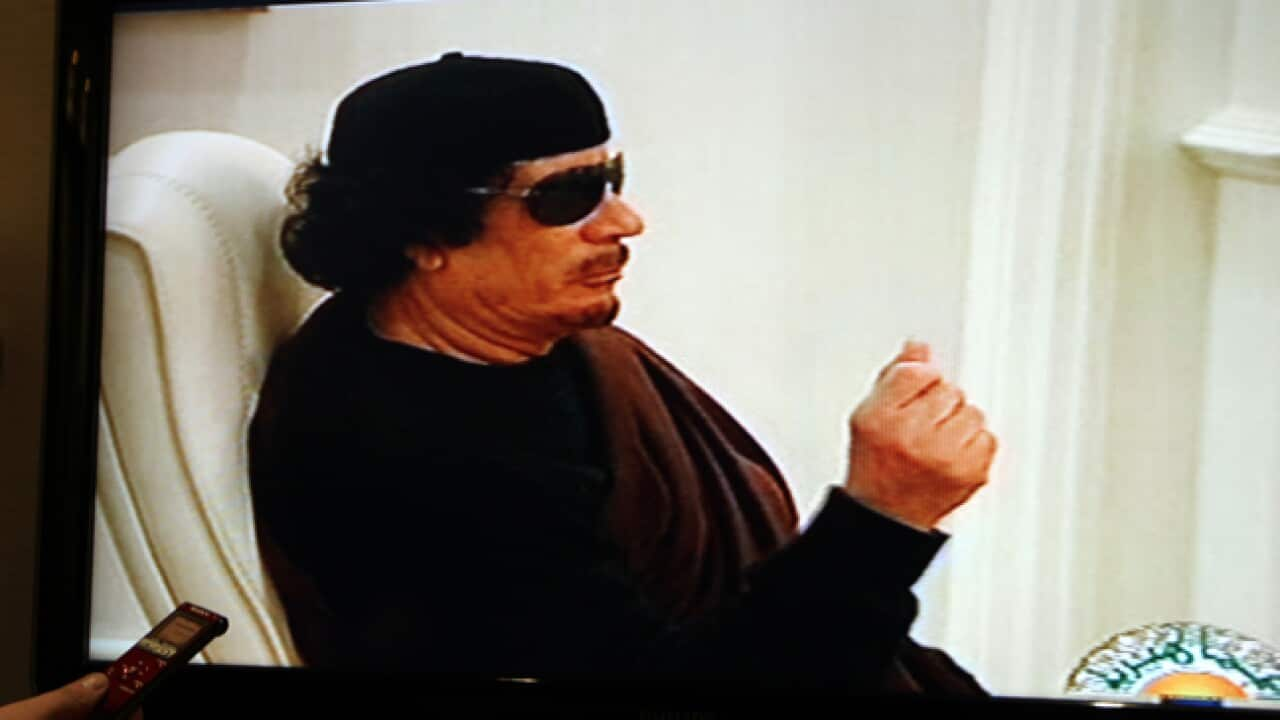NATO carried out fresh bombing raids on the heart of Tripoli's regime on Saturday, the military alliance said after G8 world powers intensified the pressure on Libyan strongman Muammar Gaddafi to go.
The alliance launched a first salvo at 1:00 am (2300 GMT Friday) followed by another strike nine hours later in Gaddafi's Bab al-Aziziya compound, which NATO aircraft have targeted for four successive days.
The strikes came after US President Barack Obama had said the United States and France were committed to finishing the job in Libya, and as Russia finally joined explicit calls for Gaddafi to go.
"We are joined in our resolve to finish the job," Obama said after talks with French President Nicolas Sarkozy at the G8 summit of industrialised democracies in France.
But Obama warned the "UN mandate of civilian protection cannot be accomplished when Gaddafi remains in Libya directing his forces in acts of aggression against the Libyan people".
His comments were followed only hours later by fresh air strikes on a command and control centre in Bab al-Aziziya, a NATO mission spokesman told AFP.
"Three bombs were dropped on the Tripoli target," he said on condition of anonymity.
An AFP correspondent said the second strike, which caused a powerful explosion, hit an army barracks at around 10:00 am.
The series of blasts have caused the collapse of sections of imposing walls around the barracks, which is full of warehouses, although the Libyan authorities say they are empty.
London said the NATO strikes brought down guard towers.
"For decades, Colonel Gaddafi has hidden from the Libyan people behind these walls, spreading terror and crushing opposition," the Ministry of Defence said in a statement, quoting communications officer Major General John Lorimer.
The latest strike "sends a powerful message to the regime's leadership and to those involved in delivering Colonel Gaddafi's attacks on civilians that that they are no longer hidden away from the Libyan people behind high walls," Lorimer said.
In a statement, NATO said its warplanes struck a command and control facility in Tripoli on Friday and hit ammunition storage facilities in Gaddafi's hometown of Sirte, in Mizdah south of the capital and the town of Hun in central Libya.
Elsewhere in Libya
Elsewhere, rebels fought Gaddafi loyalists near an oil facility in the eastern crossroads town of Ajdabiya, in a clash which left two insurgents dead, rebel commander Jamal Mansur told AFP.
Sporadic clashes were also reported around the rebel-held southern oasis town of Jalo.
The port city of Misrata, meanwhile, was crawling back to normal life, said Fadl Moukadem from Mercy Corps, a non-government organisation.
"A lot of checkpoints have been removed, traffic lights have started working, the city is busy cleaning the sand used to block the roads, and workers are watering the grass in public parks and roundabouts," he told AFP.
G8 leaders issue call
On Friday, G8 leaders from Britain, Canada, France, Germany, Italy, Japan, Russia and the US called for Gaddafi to step down after more than 40 years in the face of pro-democracy protests turned full-fledged armed revolt.
"Gaddafi and the Libyan government have failed to fulfil their responsibility to protect the Libyan population and have lost all legitimacy. He has no future in a free, democratic Libya. He must go," they said in a final statement.
Libya rejected the G8 call and said any initiative would have to go through the African Union, which on Thursday called for an end to the NATO strikes.
"The G8 is an economic summit. We are not concerned by its decisions," said Libya's deputy foreign minister, Khaled Kaaim.
Tripoli, he said, had no confirmation of a change in Moscow's position after President Dmitry Medvedev toughened Russia's stance at the G8 meeting by declaring: "The world community does not see him (Gaddafi) as the Libyan leader."
Rebel leader welcomes shift
But rebel leader Mustafa Abdul Jalil welcomed the apparent shift in Moscow's position.
"We value the role of Russia in international affairs," he told reporters in the rebel capital Benghazi.
Kaaim confirmed the visit on Monday of South African President Jacob Zuma, without indicating whether Gaddafi's departure would be discussed.
The Libyan regime says it wants a monitored ceasefire.
But NATO insists it will keep up its air raids until Gaddafi's forces stop attacking civilians and until the regime's proposed ceasefire is matched by its actions on the ground.
And on Saturday, Canadian Prime Minister Stephen Harper hoped to receive unanimous support from parliament for a "reasonable" extension of Canada's military mission in Libya.
Arab League chief Amr Mussa said there was a yawning gap between Tripoli and the rebel National Transitional Council (NTC) on Gaddafi's fate, with the rebels demanding he go immediately and the regime saving his exit for "later".
Share

